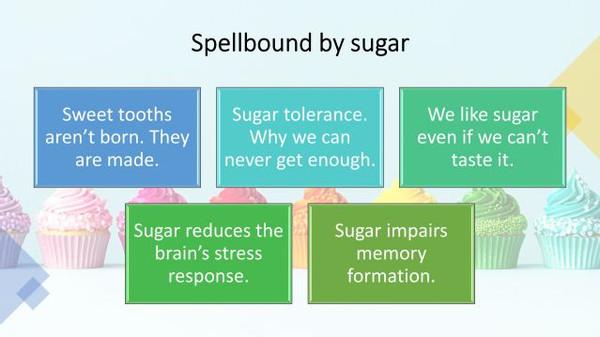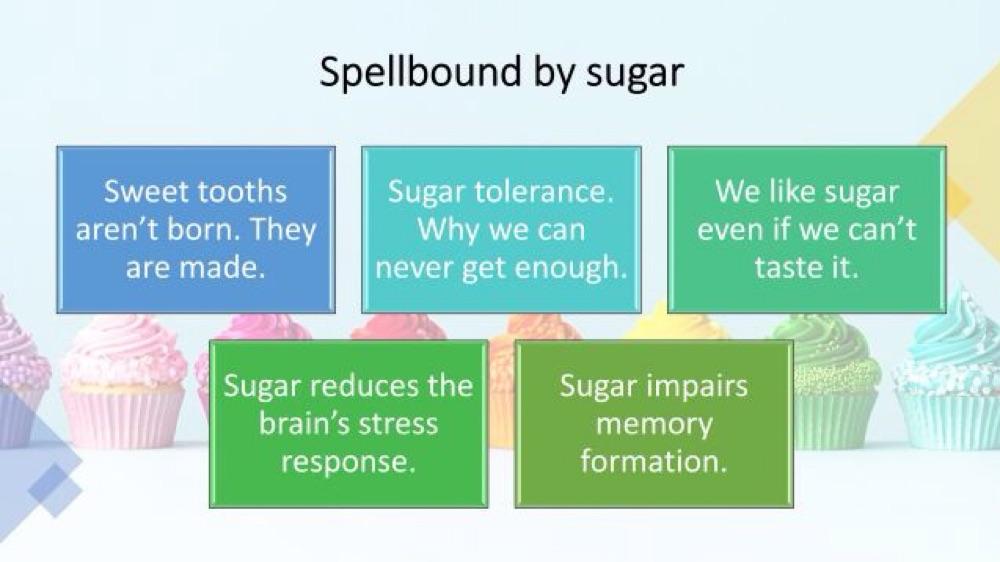Sugar: 5 Surprising New Findings From Neuroscience
Curated from: psychologytoday.com
Ideas, facts & insights covering these topics:
12 ideas
·6.36K reads
57
2
Explore the World's Best Ideas
Join today and uncover 100+ curated journeys from 50+ topics. Unlock access to our mobile app with extensive features.
A Nutritious Drug
Sugar is the Dr. Jekyll and Mr. Hyde of the nutrition world. Pleasure and poison, desire and danger, love and Lucifer; sugar somehow embodies all these qualities and more in our modern culture. Part sweet-tasting nutrient (sugar is a source of carbohydrates, one of the three major macronutrients along with fat and protein) and part mind-altering substance, sugar began taking Western civilization by storm in the 18th century. By the 21st century, sugar's candied conquest of the U.S. was complete, appearing as an additive in two-thirds to three-fourths of all food and drinks.
44
825 reads
1. Our Sweet Tooth May Be Made Rather Than Born
In a March 2023 study published in Cell Metabolism, researchers reported findings from a clinical trial of normal-weight adults assigned to consume either a daily high-sugar/high-fat snack or a low-sugar/low-fat snack. Over the 8 weeks of the study, the researchers observed a pronounced increase in the high-sugar/high-fat group’s dopamine response to the sweet snack and a pronounced decrease toward low-sugar/low-fat options.
43
700 reads
Exposure Over Genetics: The Rewiring Effect
What does this mean? A sweet tooth can be rapidly learned. With just a few weeks of regular exposure to high-sugar foods, participants’ brains in this study rewired themselves to find these foods more pleasurable and dislike alternatives.
43
631 reads
2. Sugar Tolerance Is A Real Thing
Have you ever consumed something so sweet that it actually made you feel ill? If so, ask yourself how Americans can stomach eating, on average, over 126 grams (almost 30 teaspoons) of sugar a day.
The answer is that the more sugar we eat, the more sweet-tolerant we become. Many people don’t realize that their tastebuds are dynamic. Name any primary taste—sweet, salty, sour, bitter, umami—and consider that the tastebuds detecting them change (i.e., becoming more or less sensitive) depending on how much we’re exposed to that taste.
44
579 reads
A Taste Sensation
Technically called “chemosensory plasticity,” numerous studies show in species ranging from insects to humans that high-sugar diets rapidly increase tolerance to sweet tastes. What was once too sweet to stomach now becomes just right. For the typical person, this increased sweet tolerance is clearly measurable in just a month.
43
522 reads
3. We Love Sugar Even If We Can’t Taste It
Mother Nature is too smart to be fooled by artificial sweeteners. She knows how to detect real sugar. In fact, she gave us not one, but two systems to make sure of it. System one is our tastebuds: The ability to detect sweet tastes is programmed right into our mouths.
Most people, however, don’t know about the second system. Beyond our conscious awareness, we possess a biochemically mediated pathway connecting our digestive system to the reward circuits in our brain. This reward pathway is more strongly stimulated by sugar than by non-caloric artificial sweeteners.
45
501 reads
For The Love Of Sugar
This effect is so potent, for example, that scientists can conduct studies in insects and rodents where the genes responsible for sweet taste detection are deactivated (i.e., they can no longer taste sweets) and the organisms still strongly prefer sugar-sweetened (but not artificially sweetened) water due to this secondary brain-reward system.
43
453 reads
4. Sugar Is A Pacifier For The Mind
One of the most common reasons fueling our sugar preoccupation is the rapid soothing effect it has on our emotions. Almost from birth, we begin pacifying ourselves with food and drink. The most effective “comfort foods” almost always contain significant amounts of natural or added sugars (e.g., pizza is often rated as the favorite comfort food in the U.S., yet even a typical slice of pizza contains five to six grams of added sugar). This is no coincidence.
43
434 reads
A Potent Balm
Sugary foods calm us in two ways: via the hedonic properties of the food (sugar triggering the dopaminergic brain reward pathway) and by altering metabolic and neurohormonal function (e.g., lowering cortisol levels and up-regulating “happiness hormones” like serotonin). In combination, these effects make sugar a potent balm for stress and predispose us to overconsumption.
43
415 reads
5. Sugar Delights The Senses But Dampens Brain Function.
Although health experts caution us about sugar consumption due to sugar’s contribution to obesity and diabetes, arguably the most worrisome harm associated with sugar is its effect on brain function.
Sugar appears to interfere with healthy brain function in at least two ways. Firstly, some laboratory experiments show that sugar adversely affects genes regulating the hippocampus—an area of the brain critical to memory and learning. Surprisingly, the negative impact of sugar on hippocampal function may be as severe as the effects of early life stressors.
52
414 reads
A Direct Attack And A Covert Attack
Secondly, excess sugar consumption causes dysbiotic changes in the gut microbiome (the bacteria living inside the stomach and intestines) that also disrupt the hippocampus. Collectively, this research may help explain the growing scientific consensus regarding a potential causal relationship between high-sugar diets and dementia.
44
437 reads
The Takeaway
Sugar is a ubiquitous and pleasurable part of modern life. Yet like other two-faced companions of modernity—such as social media and smartphones—we can benefit from research that helps us balance the risks versus rewards.
42
452 reads
IDEAS CURATED BY
CURATOR'S NOTE
While most recent media attention to sugar focuses on potential health harms and ways to reduce sugar intake, neuroscientific research about sugar has revealed how and why this plain white substance wields so much power in our lives. Here are five of the most compelling findings.
“
Xarikleia 's ideas are part of this journey:
Learn more about food with this collection
The differences between Web 2.0 and Web 3.0
The future of the internet
Understanding the potential of Web 3.0
Related collections
Similar ideas
5 ideas
Understanding What Sugar Really Does to Your Brain
verywellmind.com
4 ideas
5 ideas
Why We Get Sugar Cravings? (Reasons & How to Stop Them)
healthinsiders.com
Read & Learn
20x Faster
without
deepstash
with
deepstash
with
deepstash
Personalized microlearning
—
100+ Learning Journeys
—
Access to 200,000+ ideas
—
Access to the mobile app
—
Unlimited idea saving
—
—
Unlimited history
—
—
Unlimited listening to ideas
—
—
Downloading & offline access
—
—
Supercharge your mind with one idea per day
Enter your email and spend 1 minute every day to learn something new.
I agree to receive email updates

